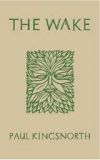
05 Apr 2014 01:04:49
Refusing to use the past as mere picturesque setting, the best historical fiction doesn't so much give us a glimpse into that foreign country as let us look out from it. Language is the key. In my novel Ulverton, set in a village over 300 years, I used strict imitations of period language to find my way into the folds of each century, while Hodd, set in the 13th century, purported to be a translation of a Latin manuscript. For The Wake, a novel set in 11th-century Lincolnshire during and after the Norman invasion, Paul Kingsnorth has adopted another solution: he writes in what he calls "a shadow tongue", a language "intended to convey the feeling" of Old English through borrowed vocabulary and syntax – much as Russell Hoban did with modern English to conjure a devastated future in his post-apocalyptic Riddley Walker.As The Wake's first-person narrator revisits the trauma of an invasion by "ingenga" (foreigners) that changed our islands for ever (and mostly for the worse), we leave history on the desk and wade through muddy experience by dint of our exercised imaginations. Hastings might have gone the other way, but it didn't, and for three centuries the elite talked another language. Kingsnorth is a green activist, author of an attack on corporate control and blandness called Real England, and his first novel has a fierceness about it that gives it real heft.
Apart from a subdued sense that the novel intends a modern parallel with our own dispossessed times, the narrative keeps us firmly within its very particular universe: we are linguistically belted in for the entire ride. The small effort it demands of the reader triggers a greater engagement, and the effort lessens as the pages turn. More importantly, Kingsnorth has a sensitivity that lifts what might have been a clever exercise into a literary triumph. "Loc it is well cnawan there is those wolde be tellan lies and those with only them selfs in mynd," runs an early sentence. Lies and truth, self-belief and self-delusion, these are the key themes as the narrator, "buccmaster of holland" – a proudly independent free-tenant farmer in the Lincolnshire fens, given to wife-beating and foul-mouthed fits of rage – turns to guerrilla warfare after the "frenc" occupiers destroy his farm and family.
Part of the appeal of the story lies in its revelation of a profoundly damaged man. Influenced by his grandfather and an inherited rune-scribbled sword, Buccmaster is a worshipper of the old pagan gods who talks to trees and hates the priests and their hypocrisy – a proto-Robin Hood furious at being treated like "fuccan swine in our own land".
This big-talking leader of men lacks both compassion and tolerance, however, and it proves his undoing. Like the Roman mercenaries in Alan Garner's Red Shift (another linguistically uncompromising historical novel), his resistance movement is no more than courageous bluff and a gaggle of unkempt blokes living wild, one of many scattered pockets of "green men". He has no intention of joining the other bands, however: his jealousy of Hereward the Wake's resistance movement adds an almost comic touch to his character, but also reveals his monomaniac tendencies.
Set pieces full of suspense and a vivid sense of a much emptier landscape prove that, when it comes to description, less is more. With equal economy, particularly in the clipped dialogue, Kingsnorth keeps up the pace: the killing of a shaven-headed Norman thegn – "with my scramasax i saws up until his throta is cut and blaec blud then cums roarin out lic gathran wind" – leads to dreadful reprisals for an innocent hamlet. This troubles the men but not, alarmingly, their leader, an increasingly amoral force of nature whose ancient beliefs are now yesterday's news, and whose grandfather's idea of what is "triewe" – kings "of wodens blud" buried in great ships and so forth – leaves the grandson fatally out of touch. He is less a Christ figure than a man increasingly absurd in his paranoid self-delusion, picking up hints of doubt from his fellow guerrillas yet incapable of adjusting except through violence.
Repeated treacheries, however, suggest his caustic view of people is not so awry. The word "smercan" – "smiling" but also "smirking" – tolls eerily throughout, as does "cwelled" ("killed") and "fuccan", the latter making him sound like a beer-swilling yob, yelling at the world as it talks nothing but the proverbial "scit". His vision of a great black bird with human fingers and his hearing of voices make him either mad or a prophet, and this ambiguity troubles the tale's often lyrical surface until the surprising close. Like a redneck recluse stocking up his arsenal against apocalypse, Buccmaster is both utterly believable and quietly tragic – a man of limited intelligence faced with a monstrous change against which sheer bravado, driven by the earth gods though it is, can only shatter.

